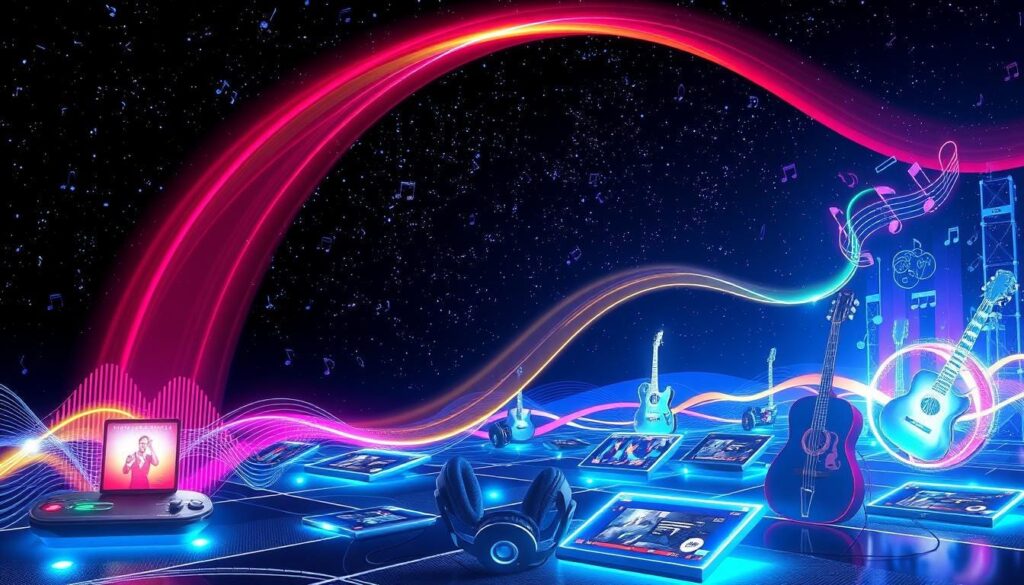In the last several years, music and technology have converged to transform the way we create, distribute, and consume music. From artificial intelligence-driven production software to virtual reality concerts, the future of music technology holds great promise for artists and music lovers alike. But what does the future look like,and how can you contribute to it?
H2: The Evolution of Music Tech: A Brief Overview
Music technology has come a long way:
Tape decks and vinyl to DAWs, cloud studios, and streaming: We’ve gone from analog to digital.
Creation democratized: Equipment that was once beyond our means now costs nothing or is inexpensive,on your laptop or phone.
Data-driven creativity: Machines track what we listen to and generate recommendations, remixes, and even new music.
The bottom line? Leveling the playing field, technology has made it possible for anyone, even an untrained person, to produce broadcast-quality tracks. With emerging tech, this access expands even wider.
H2: AI in Music Creation: Friend or Foe?
Much conversation (and angst) about AI in music has been occurring:
AI-empowered tools: From chord progression creators to vocal enhancers and beat makers, AI offers new creative building blocks.
Full-track generation: Equipment is now able to produce original tracks in predetermined styles, classical, lo-fi, EDM, with minimal contribution from humans.
Tune personalization: AI makes it easy for tracks to be customized to personal tastes,ideal for mood playlists or fitness training apps.
Still in the future: fully automated AI music systems that evolve based on real-time audience feedback-and even generate in real-time. This opens up new prospects for dynamic video game soundtracks, virtual reality (VR), and immersive applications.
H2: Music Tech Revolution through Homebrew
One of the most thrilling trends is the rise of DIY music tech. Whether you’re a bedroom beatmaker or an aspiring sound designer, you can now experiment on your own terms. This includes building your own AI music generator for free using open-source libraries such as Magenta (from Google Brain) or Jukebox (from OpenAI). You can download code, train models on your computer, and generate unique audio,all without spending a dime.
Top tools to explore:
Magenta Studio – A suite of free melody, drum, and style generation tools.
Jupyter + TensorFlow – Coding in real-time to train your own AI models.
Open-source DAWs – Software like Audacity and LMMS to mix and edit.
Co-creation platforms – Platforms like Splice and BandLab enable you to co-create with artists globally.
In the not-so-distant future, “musician” won’t just equal “artist”—it could equal “developer” or even “model-trainer.”
H2: Actionable Insights to Step Into the Future
In on this revolution? Here’s your roadmap:
1. Learn the basics of sound and AI
Free tutorials from Coursera, edX, and YouTube can teach you the basics of sound synthesis and machine learning.
Learn waveforms, spectrograms, and simple neural networks.
2. Hands-on experiments
Start with Magenta Studio or Tone.js for web experiments.
Train a model on 500 MIDI files from your favorite genre and try remixing them.
Participate in GitHub and work on open-source music projects.
3. Roll your own setup
Use Python to script workflows: load audio, process it, export results. This leads you to reproducible creative pipelines.
Connect your setup with live performance software like TouchDesigner or Ableton Link.
4. Collaborate and build community
Share your experiments on Twitter, Discord, and specialist forums like MusicML.
Share beta tracks and ask for feedback. Many seasoned creators like to mentor beginners.
H2: New Horizons in Music Tech
Let’s gaze into the future-being present:
Immersive VR/AR concerts
There are already live VR concerts- thousands of listeners tune in as avatars perform live in virtual concert venues. AR filters insert real-time music visualizations into your real-life space. Search for SDKs to allow one-man bands to build virtual concert halls or “listen spaces.”
Adaptive soundtracks
Tracks that shift tempo, harmony, or instruments based on the intensity of the workout, emotional feedback from a wristband, or instantaneous game play. That’s adaptive music,and AI is the key to making it scale.
Blockchain + NFT for rights
Blockchain platforms are making new ways of monetizing rights and royalties possible. You can tokenize songs or snippets, fractionalize ownership, and ensure transparent royalty payments through smart contracts. Open-source platforms like Audius are leading this charge.
H2: Examples from the Real World
The following are some outshining innovators:
LANDR – Provides AI mastering that learns from leading engineers.
Endless – Collaborative mobile jamming with real-time loops.
OpenAI Jukebox – Creates full-album songs in the style of various artists.
Learning from these platforms yields insights on how they merge user experience, machine learning, and monetization models to succeed.
H2: Getting Started. Contribute to any of these platforms in your own way.
If you’re a coder:
Promote open-source AI software.
Write plugins or bridges connecting AI models to DAWs.
Build live instruments with MIDI control and machine learning.
If you’re not a coder:
Provide user testing and feedback.
Design music scenarios,e.g., mood-based playlists, for adaptive devices.
Help build narratives or interactive experiences in VR music spaces.
H2: Measuring Your Impact
To track your progress:
Track engagement metrics (streams, downloads, shares).
Keep tabs on community feedback (likes, comments, open-source contributions).
Measure technical advancement (e.g., shifting from pre-programmed models to custom-trained ones).
H2: 2025 Music Tech State
Let’s do some math:
These numbers paint a picture: music tech’s future isn’t hype—it’s an explosively expanding ecosystem.
Conclusion: Your Place in Music Tech’s Future
Music tech isn’t just in labs or studios anymore. It’s in your laptop, your phone, your browser,and waiting for you to find it. No matter what your skill set is, you can:
Code creative tools,
Remix and release AI-generated tracks,
Create immersive music environments
Or simply become a catalyst in a thriving open-source community.
And yes, whether you’re mixing beats in your bedroom or writing code in your workspace, you’re already part of this future.

